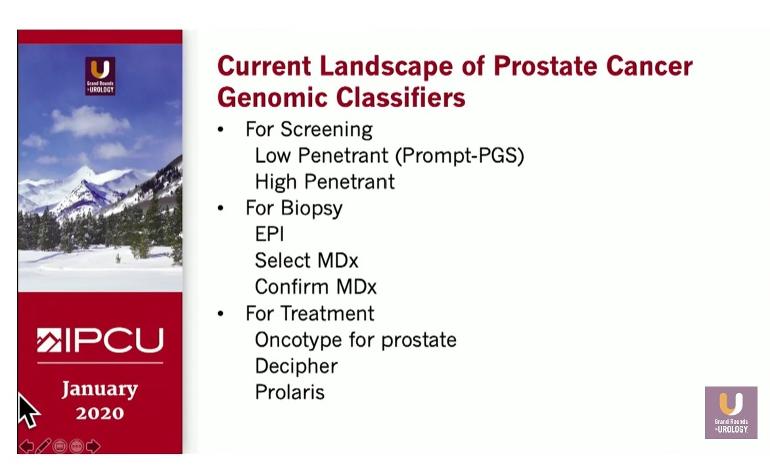Summary; a short, clear explanation of genetic testing with clarifications for what is Genomic/ Somatic versus Germline testing. Of interest to me was the need to conduct testing of PCa patients to determine who to aggressively manage/ treat. Germline testing with high penetrance marker identification was key to this podcast. High Penetrance testing is normally run on patients with a family history of PCa. When combined with Prompt PGS (prostate genetic score) filtering High Penetrance testing has sensitivity for high grade PCa of 84%, and MET of 94%! More important its NPV (negative predictive value), meaning that when its negative its correct, is 97%! My Father and Grandfather had PCa; I have PCa…it appears that I should consider Germline testing which would not help me now as much of my treatment has already been done, but it will determine if my Son’s are at risk.
Last are the PCSM (cancer specific mortality) data presented at Min 7:46. Survival from two extensive studies show excellent outcomes, so the need to use both Genomic and Germline testing to better stratify PCa patients at risk, prior to treatment decisions, is most important. Not everyone needs every treatment and the current 'one treatment fit all' approach may be the real overkill in PCa treatment, not PSA screening!
PS for those thinking about repeat Biopsies see Min 6:32. ConfirmMDx outperforms using only PSA by a wide factor; think about getting this test done before you repeat your test.
Podcast: A. Karim Kader, MD, PhD, FRCSC, Professor in the Department of Urology and Director of Urologic Oncology at the University of California, San Diego. Highlights follow;
1. Min 00:40 Genomic vs Germline Testing – Definitions of Genomic (Somatic) vs Germline testing. Somatic not heritable vs Germline which is.
2. Min 1:20 High vs Low Penetrance Germline Genetic Markers – High penetrance markers confer higher risk and more aggressive cancers. These are rare; 5% of population. Low penetrance are applicable to 100% of population.
3. Min 2:05 Who Benefits from Screening – 2.7% of men without PCa had High Penetrance markers, but this increases to 12% of those with MET.
4. Min 2:56 Family Members w PCa – High Penetrance testing is normally run on patients with PCa in multiple family members. Results can affects family members.
5. Min 4:11 Prompt Score Predictive Values – The PGS (prostate genetic score) Prompt score of 0.6 defines the threshold under which PCa predictions can be generated. Validated in over 100,000 patients. High sensitivity for high grade PCa (84%) and MET (94%) plus 97% NPV (negative predictive value).
6. PCPT PCa Prevention Trial – largest in history; 8321 patients. 7 year study. Those at end without PCa received biopsy. Percents shown are the total needed to screen to find active PCa disease.
a. UPS universal prostate screening – shown are percent of any PCa and HG (high grade) cancers found.
b. FH Family History or PSA >2.5 – only 1021 would have been screened with the lowest PCa diagnosis of them all. Significant finding!
c. Prompt - Prompt score selection topped them all with 31.4% of any PCa found but 51.1% of HG (high grade) PCa identified.
d. PSA levels – criteria of PSA greater than 1.0 or 1.5 would have required testing of only half to less than ¼ of the patients with rates of PCa diagnosis no better than testing all patients.
7. Min 6:32 Who to repeat Biopsy – ConfirmMDx based on DNA signature. Outperforms PSA by a factor or nearly 7 times in finding PCa with GS >7.
8. Min 6:50 Who to Treat - based on Genomic/Somatic testing, Oncotype, Decipher and Prolaris are three types noted.
a. Sample error – largest problem with testing.
b. Oncotype – reports on MET at 10 yr n PCSM at 10 years w GS >4+3 and/or pT3+.
c. Decipher – reports on MET at 5 n PCSM at 10 yrs w GS >4+3 and/or pT3+.
d. Polaris – reports risk assessment for BCR, MET and PCSM. Only test validated on conservatively managed patients;
9. Min 7:46 PCSM n OM Studies – outcomes from two studies show 15 year PCSM of 5.7% for GS >7. Excellent survival for patients with lower GS. Stresses need to classify patients before treating them to determine who need treatment and who can be monitored.
LINK: You Tube - youtu.be/eSUNnXU7Mok
